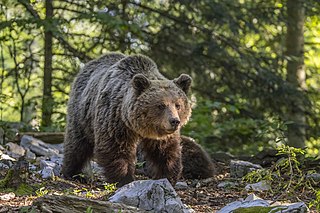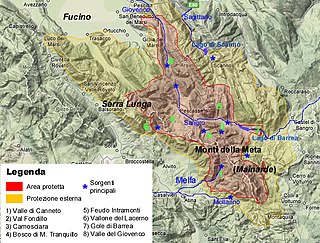
The European Environment Agency (EEA) is the agency of the European Union (EU) which provides independent information on the environment.

Abruzzo, historically known as Abruzzi, is a region of Southern Italy with an area of 10,763 square km and a population of 1.3 million. It is divided into four provinces: L'Aquila, Teramo, Pescara, and Chieti. Its western border lies 80 km (50 mi) east of Rome. Abruzzo borders the region of Marche to the north, Lazio to the west and north-west, Molise to the south and the Adriatic Sea to the east. Geographically, Abruzzo is divided into a mountainous area in the west, which includes the highest massifs of the Apennines, such as the Gran Sasso d'Italia and the Maiella, and a coastal area in the east with beaches on the Adriatic Sea.

The Eurasian brown bear is one of the most common subspecies of the brown bear, and is found in much of Eurasia. It is also called the European brown bear, common brown bear, common bear, and colloquially by many other names. The genetic diversity of present-day brown bears has been extensively studied over the years and appears to be geographically structured into five main clades based upon analysis of the mtDNA.

Abruzzo, Lazio and Molise National Park is an Italian national park established in 1923. The majority of the park is located in the Abruzzo region, with smaller parts in Lazio and Molise. It is sometimes called by its former name Abruzzo National Park. The park headquarters are in Pescasseroli in the Province of L'Aquila. The park's area is 496.80 km2 (191.82 sq mi).

Campo Imperatore is a mountain grassland or alpine meadow formed by a high basin shaped plateau located above Gran Sasso massif, the largest plateau of Apennine ridge. Known as "Little Tibet", it is located in Gran Sasso e Monti della Laga National Park, near L'Aquila, Abruzzo, Italy.

Beskydy Protected Landscape Area (PLA) is the largest PLA in the Czech Republic. The area is 1,160 km2 (450 sq mi).
Serratorotula coronata is a species of air-breathing land snail, a terrestrial pulmonate gastropod mollusc in the family Geomitridae, the hairy snails and their allies.

Cordulegaster trinacriae is a species of dragonfly in the family Cordulegastridae. It is endemic to central-southern Italy, from Abruzzo south to Calabria and Sicily, from where it was first described. Its natural habitats are humid forests, rivers, and freshwater springs. It is threatened by habitat loss.

Courgeoût is a commune in the Orne department in north-western France.

Oenanthe pimpinelloides is a species of flowering plant in the family Apiaceae known by the common name corky-fruited water-dropwort. It is a plant of tall, lightly grazed or infrequently mown grassland and coastal meadows in Europe and neighbouring parts of Asia and North Africa.
Praviršulio tyrelis, also known as the Pravirsulio Tyrelis State Nature Reserve, is a nature reserve outside Šiauliai in Lithuania with many rare examples of flora and fauna. It officially became a botanical and zoological reserve in 1969 and has since become protected by the EU Habitats Directive and Birds Directive. At 3327 hectares the area is mostly a forest though around 13% of the land is a bog. The reserve is home to at least 100 different bird species, 14 of which appear in Lithuania's Red Book.
Coincya cintrana is a flowering plant of the family Brassicaceae. It is a hemicryptophyte plant, and it grows on walls, in steep areas and in rocky slopes. It flowers from April until June.
Nakskov Fjord is an inlet in the west of the island of Lolland, Denmark. It is about 12 km (7.5 mi) long. There are about 10 small islands located in the fjord. The largest town in the area is Nakskov. The area is a designated bird sanctuary.
The Common Database on Designated Areas or CDDA is a data bank for officially designated protected areas such as nature reserves, protected landscapes, national parks etc. in Europe.

Iris marsica is a plant species in the genus Iris, it is also in the subgenus Iris. It is a rhizomatous perennial, from the Apennine Mountains, in Italy. It has glaucous, sickle-shaped or curved, light green leaves, slender stem with 2 branches, and 3 violet, light blue violet, dark violet, and dark purple flowers. It was only found and described since 1973, and is not yet in general cultivation. It was once thought to be a form of Iris germanica, but has different morphological characteristics and different chromosomal differences.

Salix repens, the creeping willow, is a small, shrubby species of willow in the family Salicaceae, growing up to 1.5 metres in height. Found amongst sand dunes and heathlands, it is a polymorphic species, with a wide range of variants. In the UK, at least, these range from small, prostrate, hairless plants at one end of the spectrum to taller, erect or ascending silky-leaved shrubs at the other. This wide variation in form has resulted in numerous synonyms.

Topo Islet is a vegetated uninhabited islet just off the extreme southeastern tip of the island of São Jorge in the Portuguese archipelago of the Azores.
Ballynafagh Lake is a Special Area of Conservation and wildfowl sanctuary in County Kildare, close to the town of Prosperous in County Kildare, Ireland. This site is also known as the Blackwood Reservoir, the Blackwood Lake or the Prosperous Reservoir.
Coregone di Campotosto is a traditional fish dish from the Abruzzo region of Italy, typical of Lake Campotosto, this fish of subalpine origin that has found an ideal habitat in this lake. A request for recognition of native species was made to the Ministry. Thanks also to the very clean waters and selected nutrients, the quality of the whitefish meat is excellent and lends itself very well to the different ways of preparation. The fish is cooked roasted on the grill and then marinated in a preparation of vinegar and with oil and chilli pepper.

Pseudomaquis, sometimes qualified as Submediterranean pseudomaquis, are thickets of broadleaf shrubs and small trees, forming the transition vegetation between Mediterranean forests or shrublands and temperate forests. Consisting of both deciduous and evergreen plants, these thickets are found at higher altitudes near typical Mediterranean climates in Spain, Italy and southern France, in warmer, sub-Mediterranean regions of the Balkans, and in humid temperate regions affected by deforestation, such as northern Turkey and central France.













